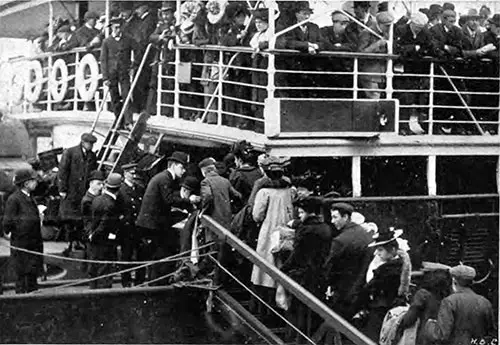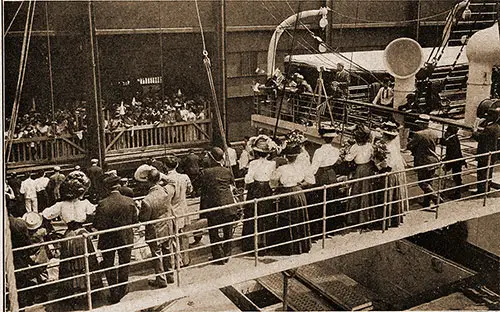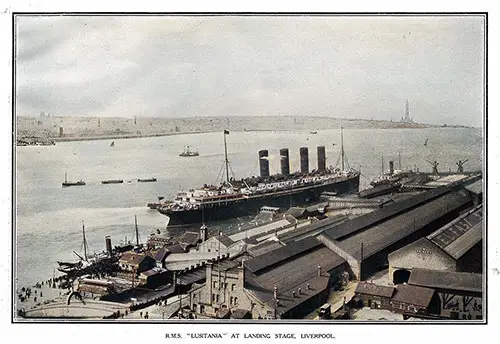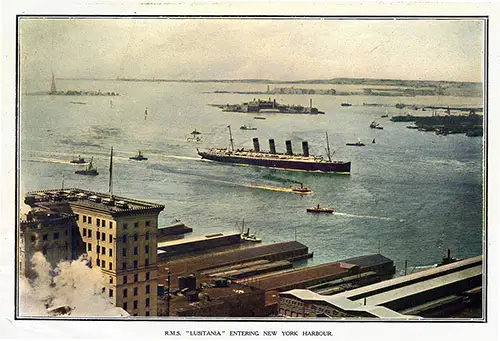Season and Climate For Transatlantic Travel

The SS Parisian of the Allan Line Embarking Passengers, The Syren and Shipping, 15 May 1907. GGA Image ID # 179e6fe6b3
Some parts of Europe are available for tourist purposes at all times of the year. Switzerland has its winter sports in winter, while in summer it is the great playground of Europe.
The summer is preferred by many travelers, as then England, Ireland, and Scotland are at their best, and France, Belgium, Holland, and Germany are also most attractive.
It is a mistake to think that Italy cannot be visited in summer, as many thousands go there each year during the hottest season. If reasonable care is used to avoid the heat of the day between twelve and two, there is little danger to health.
During these hours, the time can be spent in the galleries whose temperature is many degrees cooler than the outside air.

Many People Crowded Onto the End of Pier Seen From Deck of Departing Ocean Liner. GGA Image ID # 179d45dc62
Rome can be visited with impunity at any season of the year, but at night walks near the Tiber or Colosseum should be avoided. A few grains of quinine will usually drive away any feeling of fever.
The water in Rome is excellent. There are many resorts along the Italian shore, such as the Viareggio, which are at their best in the early spring—April, May, or June.
The Italian lakes are particularly delightful in July and August. Venice is not always as pleasant as it might be the summer, as the tide's motion in the canals is not always sufficient to render them entirely odorless.
Holland can be visited at any time of the year, as can also Belgium, France and Germany. Spain is apt to be very hot in summer and should be avoided if possible.

Waving Goodbye As Their Voyage Gets Underway. GGA Image ID # 179d495f5f
Russia is delightful in summer, but the number of tourists is limited due to the great expense of reaching it. All visitors to Russia must have a passport that the nearest Russian Consul must visit before leaving the United States.
This is absolutely essential. Travelers who are going to make a trip around the world usually leave New York in September if they travel by way of San Francisco.
Norway and Sweden and Denmark should be visited in summer only.
Austria is best visited in the spring and fall. The Mediterranean ports, particularly the Riviera, are crowded with winter residents.
Monte Carlo is perhaps the most beautiful point on the Riviera. Algeria and Morocco, and Tunis all have their share of winter visitors, while the Holy Land and Egypt are visited by many thousands.
The great steamship lines run each winter specially conducted tours to Egypt and the Holy Land, reducing transportation cost very materially.
Formerly many persons took poor accommodations on sailing ships in order to benefit their health. People who are ill or who are not very strong still stick to the sea as a rest and air cure.
However, they select the more comfortable liners as the care and attention they receive seldom fail to benefit their health. After fighting the sea and its terrors for thousands of years, man has at last succeeded in conquering the sea, this wildest and most unruly of Nature's children.
Against the modern iron or steel ship, which is equipped with every measure of protection that science and engineering can devise, the sea is almost powerless.
Smaller vessels and sailing craft still feel its fury occasionally, it is true, but the enormous ships of the present day forge their way through the mighty ocean at high speeds.
Men of science have studied and analyzed the curative powers of the sea and have awakened an understanding and appreciation of these qualities in ever-widening circles of humanity.
Increasing interest is taken by the medical world and the general public as to sea trips as a curative remedy, which is due to a large extent to the improvements introduced in the navigation of late years.
The accounts of the dangers of ocean trips in former times, the primitive and unhealthy accommodations, and insufficient catering on board of ships of earlier periods are very disquieting to intending travelers.
This has now, however, all been done away with, so that the modem steamers of today have so many safety devices, and the perfection of the instruments for the navigation of the ship, and the reliability of the charts, the number of light-houses, have been brought to so perfect a standard that a voyage on a modern steamer entails less danger than a journey by train.
The old foul-smelling state-rooms of thirty years ago have given place to clean, spacious, splendidly ventilated rooms where there is not a suspicion of an odor of any description, even in in-side rooms on the lower decks.
Superior methods of keeping food have resulted in catering, which is equal to that of the very finest hotels. The sea air is most invigorating, especially for those suffering from insomnia and nervous troubles.
The abundance of sunshine, especially on the Southern seas, in the Mediterranean and Adriatic, exerts a beneficial influence on the metabolic assimilation and the formation of the blood.

Passengers from the RMS Aquitania at Southampton Railway Station. GGA Image ID # 179d516a66
Taking it all in all, sea trips are very strongly recommended as important hygienic factors, and the development of all that contributes to their facilitation should be greatly appreciated, especially by the medical profession.
It should be remembered that the air of the high seas is the purest of all and that there is an entire absence of dust and germs. It has been proved that at a distance of seven and a half miles from land, there was only one germ for 40 liters of sea air, and at a distance of thirty miles, only one germ for 1522 liters of sea air, and beyond that limit the air was practically germless.
It also follows from these investigations that a complete absence of dust and germs by no means prevails on the coast, as is generally assumed.
The invigorating effect of the ocean climate is based upon a good many qualities which vary not only according to the locality of the particular sea and the season of the year but also have a different effect upon people according to their particular constitution.
Above all, there is a great quantity of moisture in the sea air that facilitates breathing, and secondly, the density of the atmosphere acts upon the body like a permanent bath.
It is a well-known fact that very dry air irritates the respiratory organs and causes inflammation of the same and that on the other hand, extremely moist air gives rise to heavy breathing, whereas if a normal quantity of vapor is contained in the air, breathing becomes easy.
It is a well-known fact that very dry air irritates the respiratory organs and causes inflammation of the same and that on the other hand, extremely moist air gives rise to heavy breathing, whereas if a normal quantity of vapor is contained in the air, breathing becomes easy.
The sea air contains a considerable percentage of salt, some iodine and bromine, and a large ozone percentage.
A sea trip is especially recommended for diseases of the respiratory organs, i. e., chronic catarrhs of the mucous membranes of the mouth, the nose, the pharynx, the larynx, the bronchia, and the lungs. In the fresh sea air, the diseased organs can recuperate and recover better than any-where on land.
Those suffering from tuberculosis, however, are warned by most physicians against trying a sea trip. The best authorities recommend prolonged sea trips only in cases where there is only a danger of tuberculosis or where the disease has come to a standstill, and the patient is otherwise strong enough to make a sea trip.
We have already referred to the benefit which a sea voyage gives in nervous affections. The calming influence exerted on the patient by the view, the feeling of absolute retirement and forced absence from business worries, is practically a cure for a multitude of nervous complaints.
Those who suffer with diseases of the heart were formally warned by their physicians against making sea voyages, but according to recent experience, the sea trip cure is recommended for a number of diseases of the heart, particularly for those who suffer from a so-called heart neurosis, also from the weakness of the cardiac muscle and valvular defects.

The RMS Lusitania at the Landing Stage at Liverpool. | GGA Image ID # 179d5ba23c
Sea trips are also recommended for patients recovering from typhoid fever, scarlet fever, measles, puerperal fever, pleurisy, inflammation of the lungs, malaria, and in fact, for all persons who are weak and anemic.
Any reputable physician is qualified to advise the subject of sea cures and any special treatments that should be taken.
There is so much excitement and so much going on the ten or a dozen largest crack steamers that those who are ill should select a smaller boat during the rush season.
A boat taking two or three days longer will only increase the pleasure and the benefit of the trip.
Go abroad with shoes in perfect condition. Repairs are apt to be astonishing, and soles made of paper instead of leather are not unknown.
Take a new pair of rubbers. They are sometimes difficult to obtain abroad and are expensive. Remember that rain must always be expected in England. You are safe in carrying an umbrella everywhere.
English umbrellas are expensive and heavy. Do not buy them as presents to take home. Raincoats are good and cheap in England. Re sure that you buy a good house. The ordinary "mackintosh" as worn in England, does not stand our climate. Select dark colors always.

The RMS Lusitania Entering New York Harbor. | GGA Image ID # 179df27116
